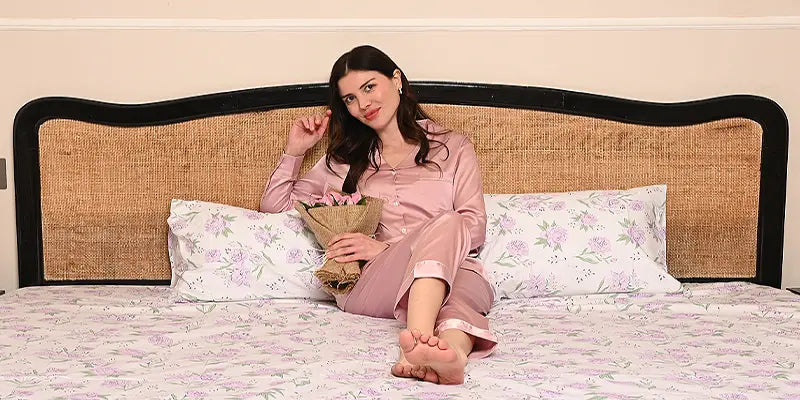
How To Relieve Stress for Bedtime
Recent studies show that stress is a major reason why Indians are staying up late. High stress levels, combined with long working hours, and constant exposure to digital screens, especially on social media and OTT platforms, make it harder for people to relax at night. This stress leads to late sleep patterns, as many find it difficult to unwind and fall asleep.
In this blog, we’ll explore some effective and simple ways to relieve stress before bedtime to help you relax and sleep well at night.
10 Ways to Relieve Stress for Bedtime
Here are 10 simple and effective ways you can follow to drift off faster at night:
Create a Calming Bedtime Routine
Your body loves routines. By creating a consistent bedtime ritual, you signal to your brain that it’s time to wind down. You can add these into your nighttime routine:
- Reading a book (choose something light and enjoyable, not work-related)
- Taking a warm bath or shower
- Sipping on a caffeine-free herbal tea, like chamomile or lavender
- Practicing gentle stretches or yoga
These activities help shift your mind away from stress and into a more relaxed state. You can do anything that you feel is relaxing and doesn’t make your mind more attentive.
Unplug from Technology
Doomscrolling is one of the main reasons people find it difficult to fall asleep at night. Scrolling through social media or watching intense TV shows before bed can overstimulate your brain and increase stress levels. The blue light from screens also interferes with your body’s production of melatonin, the hormone that helps you sleep. Try to do these before bed:
- Turn off your phone, laptop, and TV at least 30 minutes to an hour before bed.
- Replace screen time with calming activities like journaling or listening to soft music.
By doing so and making it a habit of not using a screen before bed, you can sleep faster and better at night.
Practice Deep Breathing or Meditation
Deep breathing and meditation are powerful tools for calming your mind and body. Here’s a simple technique to try:
- Lie down in bed or sit comfortably.
- Close your eyes and take a slow, deep breath through your nose for a count of 4.
- Hold your breath for a count of 4.
- Exhale slowly through your mouth for a count of 6.
- Repeat this cycle for 5-10 minutes.
By doing this deep breathing exercise daily, you can activate your body’s relaxation response and sleep reduce stress. This will help you sleep better and you’ll wake up refreshed.
Write Down Your Worries
If your mind is buzzing with thoughts, grab a notebook and write them down. Writing out your worries or to-do lists can help you “offload” them from your brain, making it easier to let go and relax. Try listing:
- Things you’re grateful for (gratitude journaling can shift your focus to the positive)
- Tasks you need to tackle tomorrow (so you don’t have to think about them tonight)
You can invest in a gratitude journal, making it a habit to journal daily can help you relax better.
Create a Sleep-Friendly Environment
Your bedroom should feel like a peaceful sanctuary. Make sure it’s set up for relaxation by:
- Keeping the room cool, dark, and quiet.
Use calming scents like lavender or eucalyptus (try a aroma diffuser or pillow spray). - Investing in comfortable bedding and sleeping pillows.
A cozy, stress-free environment can make a big difference in how quickly you fall asleep.
Avoid Caffeine and Heavy Meals Before Bed
What you eat and drink can impact your stress levels and sleep quality. Avoid caffeine (found in coffee, tea, and chocolate) in the late afternoon and evening, as it can keep you awake. Also, try to avoid heavy or spicy meals close to bedtime, as they can cause discomfort and make it harder to relax.
Try Progressive Muscle Relaxation
This technique involves tensing and then relaxing each muscle group in your body, starting from your toes and working your way up. It’s a great way to release physical tension and calm your mind. Here’s how:
- Tense the muscles in your toes for 5 seconds, then release.
- Move up to your calves, thighs, stomach, arms, and so on, until you’ve relaxed your entire body.
Practice this regularly and you’ll sleep better at night.
Set a Worry Time Earlier in the Day
If you find yourself stressing about the same things every night, try scheduling a “worry time” earlier in the day. Spend 10-15 minutes in the afternoon or early evening writing down your concerns and brainstorming solutions. By the time bedtime rolls around, you’ll have already addressed those thoughts.
Listen to Soothing Sounds
Soft, calming sounds can help drown out stressful thoughts and lull you to sleep. Try listening to:
- Nature sounds (like rain, ocean waves, or forest birds)
- White noise or gentle instrumental music
- Guided sleep meditations or bedtime stories (there are plenty of free apps and YouTube videos for this)
Don’t listen to anything distracting, try to listen to something calm like classical Indian music.
Be Kind to Yourself
Finally, remember that it’s okay to have nights where sleep doesn’t come easily. Instead of stressing about not sleeping, remind yourself that rest is still beneficial, even if you’re not fully asleep. Be patient and gentle with yourself as you work on building healthier bedtime habits.
Conclusion
Stress can make it hard to relax and get a good night’s sleep. But by making small changes to your bedtime routine, like creating a calming atmosphere, turning off screens, or practicing deep breathing, you can reduce stress and sleep better. It may take time to form new habits, so be patient with yourself. With these simple steps, you’ll find it easier to fall asleep and wake up feeling refreshed and ready for the day.








